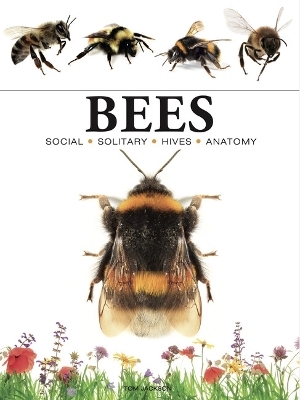
Bees
Amber Books (Verlag)
978-1-83886-357-9 (ISBN)
Bees is an outstanding collection of photographs showing these fascinating insects in their natural habitat. Honey bees, bumblebees, mining bees, dwarf bees, carpenter, leafcutter and mason bees: bees come in many different types, with more than 16,000 species worldwide. The bees we are most familiar with, bumblebees and honey bees, live in colonies and play a major role in pollinating the crops, plants and flowers around us.
And bees produce honey – reputedly the food of the gods – a function of bees’ lifecycle, which humans have exploited for millennia. Many bees today are domesticated, and beekeepers collect honey, beeswax, pollen, and royal jelly from hives for human use. A typical bee produces a teaspoon of honey (about 5 grams) in her lifetime. Bees can communicate many ways through the movement of their wings and bodies – most famously, with the ‘waggle dance’, where they make figure-of- eight circles to let other bees know the direction and distance of nectar.
With full captions explaining how bees live, function communally, communicate, feed and reproduce, Bees is an insightful examination in 190 outstanding colour photographs of mankind’s favourite insect.
Tom Jackson is a leading natural history writer based in the United Kingdom. As an author and contributor he has worked on more than 60 books. A zoology graduate from the University of Bristol, he has also worked as a zookeeper and in safari parks in Zimbabwe.
Introduction
1. Social Bees
There are around 16,000 species of bees worldwide in the Anthophila clade. Some bees live and work together. This chapter covers the eusocial life cycle of queens, drones and worker bees, revealing facts about their nests and general activity. It also introduces the most famous type of bee, the honey bee (Apis), as well as bumblebees (Bombus) and stingless bees (Meliponini).
2. Solitary Bees
Not all bees live and work with others; some like to lead their own lives. This chapter is a roll call of solitary bees, and includes mason bees, carpenter, bees, plasterer bees, digger bees, mining bees, orchid bees, cuckoo bees and sweat bees.
3. Bee Anatomy
Bees have a hard outer shell called an exoskeleton. They have three main body parts: the head, thorax and abdomen. A pair of antennae is attached to their head and they have two pairs of wings. This section contains fascinating close-up shots of every aspect of a bee’s physiology – its eyes, mouthparts, legs, feet, wings (at rest and in flight), waist, stinger, ovipositor, hairs and antennae.
4. Behaviour
There are three types of honey bees: the queen, the workers and the drones. A queen bee is the only female bee in the hive that reproduces. Worker bees are all female, and are all offspring of the queen. The males in the hive are called drones. Drones fly off to reproduce with other young queens who will start a new colony. Here we look at these roles, as well as brood care, honey production, building the honeycomb, foraging, defence and swarming.
5. Bees and Flowers
Pollen and nectar collection is a vital part of the ecosystem bees operate in, and they will fly up to 2 kilometers (1.3 miles) from the nest to collect nectar and pollen from flowers. Forager bees usually live just 30 days after they begin foraging. This is because foraging is one of the most dangerous tasks. Bees also collect water for drinking and cooling the nest.
| Erscheinungsdatum | 20.03.2024 |
|---|---|
| Reihe/Serie | Mini Encyclopedias |
| Zusatzinfo | Halftones, color |
| Sprache | englisch |
| Maße | 125 x 167 mm |
| Gewicht | 395 g |
| Themenwelt | Kunst / Musik / Theater ► Fotokunst |
| Sachbuch/Ratgeber ► Natur / Technik ► Natur / Ökologie | |
| Sachbuch/Ratgeber ► Natur / Technik ► Naturführer | |
| Weitere Fachgebiete ► Land- / Forstwirtschaft / Fischerei | |
| ISBN-10 | 1-83886-357-5 / 1838863575 |
| ISBN-13 | 978-1-83886-357-9 / 9781838863579 |
| Zustand | Neuware |
| Haben Sie eine Frage zum Produkt? |
aus dem Bereich


